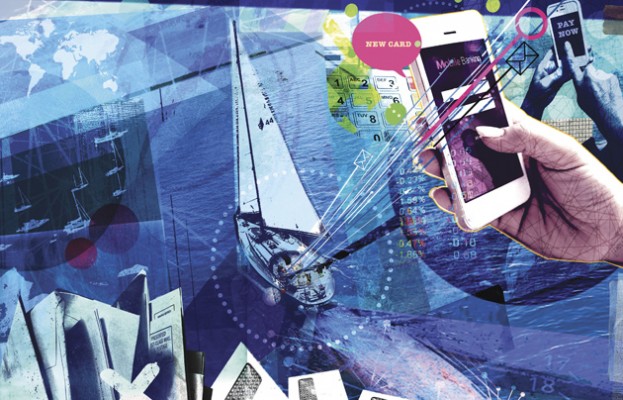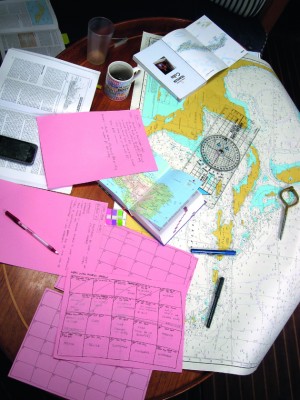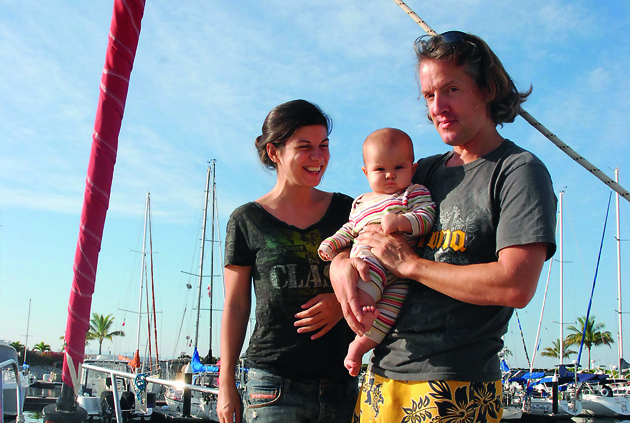Even when you cast off your lines, bills, tax returns and admin still follow in your wake. Jessica Lloyd-Mostyn explains how to make the essential paperwork easier when you’re long-distance cruising
For those who choose to escape the confines of conventional life and spend a few months, years or even the rest of our lives at sea there are many challenges to tackle. But it’s not necessarily storms, pirates or rocks that are the biggest problems. One of the hardest parts is the admin, the paperwork that follows us wherever we go: bank accounts, home maintenance and bills, taxes, mortgages and businesses.
Unexpectedly, it can be the smallest things that trip you up when cruising. Receiving post – especially important documents – and even the basic process of making or receiving a phone call can all be tricky, especially when you throw in differences in time zones, language barriers or the fact that you no longer fit neatly into the boxes that the systems managing these transactions recognise. And what happens should your plans change?
We ran into our first problem with admin on our first landfall after leaving the UK. When James used a cash machine in Spain it was swallowed. The bank was shut as it was Sunday. He had informed his bank that he would be travelling indefinitely, but the machine itself was faulty. Luckily we have separate accounts with different UK banks.
We’ve noticed some interesting differences between our two banks. Mine requires me to alert them, either by phone or online, to every single country that we visit, including dates of travel. In most places this is straightforward and doesn’t take long. But while sailing in the eastern Caribbean we were never sure of what day we’d hop from one island to the next or indeed which island we’d be aiming for. James’s bank, on the other hand, was happy to put a note on his account of global travel, meaning that transactions don’t get flagged up as suspicious when they are made in a new country.
There are many other aspects that need to be considered in advance. Laurie Felker-Jones and her husband, Damon, are from Texas and have been cruising in the Caribbean for nearly two years on their yacht, Mother Jones. Before they left they unsubscribed to every piece of electronic and hard-copy mail that was irrelevant to their cruising lifestyle. Laurie admits that doing so felt it was “completely freeing to let go of the physical and digital clutter”.
Mail surrogate
We shifted to online statements and notified companies we no longer wished to hear from. But the greater difficulty was with all the other types of important letters that we do want. Laurie and Damon’s answer was to “set up a mail surrogate. We were lucky to have a trusted family member who allowed us to use her address. She also kindly received, processed and notified us of hard-copy mail and packages which couldn’t be sent virtually.” James and I did the same, which meant that anything vital for us to action could be scanned and emailed.
But not everyone has someone who can take on such a responsibility. Our friends Max Shaw and his wife, Liz, from Halifax, Canada, are sailing Fluenta. Their method of dealing with important correspondence from home is to opt for a mail forwarding service that caters specifically to cruisers. The company, Liz says, “scans for us, then either forwards, saves, or shreds, based on our directions”.
On paper, it all sounds dull compared with the dream of the cruising life but, trust me, thinking about it a little before you set sail will mean not having to worry about it later and instead you can enjoy all the best bits of sailing
Most marinas are happy to provide you with a temporary address, as long as items clearly state your boat name. It’s also the norm for VHF radio nets in cruising areas to include announcements for ‘flat stamped mail’, notifying skippers of others’ plans to fly in or out of the area and ferry letters with them. The same goes for all boat visitors. No one comes to stay with us on board without bringing spares in their suitcases!
Running a business
A number of sailors we know fund their travels by keeping a business going back home. However, this requires both trust and regular communication in order to operate smoothly. Amber Lim and her husband, Jeff, cruised on their boat, Rockstar, for years for six months at a time before flying back to their home in Vancouver, where Amber owns and runs a dog-walking business. But in late 2013 the Lim family decided to sail full-time, exploring Central America and the South Pacific. This meant that Amber had to adopt a whole new strategy for the company.
“The business operates on automatic deposits and bill payments. The manager was given signing authority on cheques, auto insurance and other necessities. She uploaded monthly bank statements onto Dropbox, which were automatically downloaded to my computer when I hit a wi-fi zone. She also uploaded scans of any mail if she was unsure of what to do. I had online banking apps loaded onto my phone so I could check activity easily if needed. My accountant had paperwork signed authorising him to file taxes on our behalf.”
James and I have a small printer/scanner on board which can run on shore-power or with an inverter, but Amber didn’t have one. “We downloaded the Signeasy app on the iPad and were able to sign documents and then email them back. All our personal, business and boat documents were kept in files on Dropbox so we could access them from internet cafés if needed, as well as our computers and devices with wi-fi.” When the Lims sold Rockstar in early 2015 and returned home, the business was running perfectly.
We, too, finance our sailing by managing a business remotely, but in our case it’s property. We own properties in London and administer all the maintenance, tenant changes and mortgages without using an agent. The London rental market is healthy, but running the properties ourselves is not without its headaches – we had to delay our departure to Costa Rica from Panama as one set of tenants was moving out; we needed to order a new washing machine to be delivered while in Mexico and when we arrived in New Zealand we were greeted by frantic emails about plumbing leaks.
Working relationships
What ensures that everything works despite our absence is that we’ve encouraged our tenants to be as communicative as possible, so that we can pre-empt issues before they arise or become critical. We’re also fortunate in having struck up a great working relationship with a plumber, electrician and gas engineer who lives locally and is aware of our travel plans.
Amber Lim credits the success of her business while she was away to others understanding their schemes. “Despite all the planning and technology available the most valuable resource to our banking and communication was the good relationship we had with the people taking care of us. Our regular bankers, advisers, accountant and brokers knew where we were and what we were doing and went to great lengths to support us while we were away,” she says.
This makes even more of a difference when things go wrong. Terry White is from New Zealand and his wife, Sabine, is Dutch. While provisioning in Mexico they found that a wallet containing both their credit cards had gone missing. Their banks knew their circumstances, and intended imminent departure, and managed to get replacement ones couriered out in only a few days, at no cost, from opposite ends of the globe.
Our own experience of stolen credit cards highlights the difference in attitude of banking institutions. When James’s was stolen and fraudulent transactions made, he was instantly refunded and sent a new card. However it had to go to a ‘secure’ address in the UK, which meant that a family member had to forward it to us in New Zealand.
My bank had a more lengthy procedure for handling fraud, requiring several phone calls, which were neither easy nor cheap from French Polynesia, and included answering such ridiculous questions as: “Could you have simply travelled to Texas and forgotten you had, ma’am?”
Yet the process for ordering a new card was much simpler and my replacement card was waiting for me when we arrived in Fiji.
Calling home
Max and Liz on Fluenta say that, at times, getting a message home can seem rather ridiculous. “The funniest moment had to be trying to call home to Canada for some tax-related info from a town on the Sea of Cortez, Mexico, from the only point in the town with cell coverage. The basic directions to find a signal were to follow the donkey track up the hill, and ‘you will know when you are there’. We did: the spot was marked by phone card wrappers littering the ground!”
After several years at sea, we’ve learned a few lessons in lessening the pain of paperwork. We filed our last tax returns online, sitting at a bar in Panama, taking advantage of the free wi-fi and cocktails. We keep extra copies of anything vital to our lives back home and our boat documents in digital form and in bilingual versions when necessary. We alert friends, family and tenants any time that we’ll be at sea for long stretches and will have no communication.
On paper, it all sounds dull compared with the dream of the cruising life but, trust me, thinking about it a little before you set sail will mean not having to worry about it later and instead you can enjoy all the best bits of sailing.
Jessica and James Lloyd-Mostyn left the UK in 2011 in their Crossbow 42 Adamastor heading for the Caribbean, Panama and Pacific. On the way they started a family when their daughter Rocket was born in Mexico. www.water-log.com
This is an extract from the August 2015 issue of Yachting World









